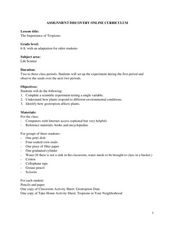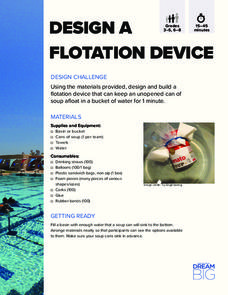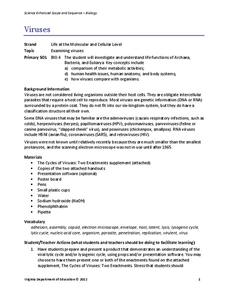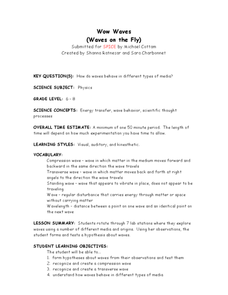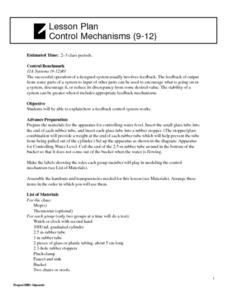Curated OER
Acids, Bases and Indicators
High schoolers investigate the pH of various solutions with indicators. For this acids, bases and indicators lesson plan, students use a variety of indicators to test solutions for their pH. High schoolers determine which indicators are...
Curated OER
Submersible Designer
Young scholars work in groups to design, build, and test a submersible prototype. In this engineering lesson, students learn about the importance and design of submersible vessels and apply their knowledge by building one of their own....
Curated OER
The Importance of Tropisms
Students investigate plant tropisms using the scientific method. In this life science lesson, students learn about tropisms and test the response of corn seedlings to gravity. Response questions, extensions, and an adaptation for...
Curated OER
Nutrition: It's In Your Hands
Fourth graders use this lesson to focus on their health, nutrition and the state of the environment. In groups, they examine the various types of land, water and air pollutants and compare and contrast a food chain with and without a...
Curated OER
Minerals Prime
In this minerals learning exercise, learners answer fifteen multiple choice questions about mineral formation, volcano and mountain formation, mineral tests and properties of minerals.
Creative Chemistry
Acids and Bases
For this acid and base worksheet, students test 13 different substances to determine their pH, the type of acid or base they are, the color the universal indicator turns, the color red litmus paper turns, and the color blue litmus paper...
Rice University
What Should You Wear In Antarctica?
Students weigh various battings and feathers. They make sure to have the same weight of each type of insulations. Students wrap one bottle of warm water in each of the two insulations. They measure the temperature of each bottle,...
Curated OER
TE Activity: Built to Last?
Fifth graders test the shelters that were built in a prior activity. They determine the level of durability and water resistance of these shelters through a scientific investigation.
Curated OER
Field Trip Preparation
Students make a contingency plan in case of unexpected events such as bad weather. They discuss safety and appropriate conduct.They map out a schedule to ensure that sufficient time is allotted for all activities.
DiscoverE
Design a Flotation Device
Save the soup! Scholars devise a flotation device using straws, balloons, foam, corks, and other objects. A can of soup must stay afloat for at least a minute with this device—your dinner might depend on it!
Virginia Department of Education
The Effects of Heat and Acid on the Enzyme Catalase
How quickly do enzymatic reactions occur? Assist the class as they examine heat and pH change to determine the rate of chemical reactions using catalase as an enzyme. Watch them "glow" with excitement!
Virginia Department of Education
Photosynthesis and Cellular Respiration
Provide high schoolers with their own indoor gardens! Emerging scientists discuss the process of photosynthesis and germinate seeds before growing plants in multiple lighting conditions. The hands-on application allows...
Virginia Department of Education
Matter and Energy: Equations and Formulas
Using simple materials, an informative lesson demonstrates the Law of Conservation of Matter and explains how to balance chemical equations. Young chemists perform experiments, analyze reactions, and balance chemical equations...
Virginia Department of Education
Viruses
Germs, parasites, and viruses, oh my! Facilitate a lesson on viruses as individuals explore functions of Archaea, Bacteria, and Eukarya. They learn how viruses compare with other organisms in nature and how they contribute to health...
Virginia Department of Education
Charles’ Law
Searching for a relatively interesting way to demonstrate Charles' Law? Here is a lesson in which pupils heat air inside a flask and then cool the flask to quickly cool the air. They make observations about what occurs during the...
Curated OER
Cool Chemistry- DIY pH Indicator
Students study the differences between an acid and a base. In this pH lesson students view a demonstration then test chemicals in groups.
Curated OER
What Kind of Garden Would Grow in Our Schoolyard?
Students perform soil tests for pH, nitrogen, phosphorus, potassium, composition and water percolation rate and assess the conditions in the schoolyard.
Curated OER
Marine Mammal Diving Reflex
Tenth graders discuss marine mammal diving reflex, and measure pulse rate while holding their breath under three conditions: control, warm water, and ice water to determine if humans exhibit marine mammal diving reflex.
Curated OER
Wow Waves (Waves on the Fly)
Middle schoolers formulate hypotheses on wave behavior and test them. In this physics lesson, students compare and contrast transverse and compression waves. They determine the wavelength of transverse waves.
Curated OER
Function of a Stem
Fourth graders perform an experiment to test the function of a stem. In this science lesson, 4th graders write a description of their investigations. Students also explain how the stem interacts with the rest of the plant. Students use...
Curated OER
Control Mechanisms
Students explain how a feedback control system works. They model a feedback control mechanism for controlling water level by observing the flow rate of water in a cylinder. In addition, they graph their data. Script for lesson is included.
Alabama Learning Exchange
Plants, Soil and Nutrients
Young scholars conduct an experiment. They review how to use the scientific method to conduct an experiment with white carnations and food coloring. They create a hypothesis and test it to better understand how plants get nutrients,...
Curated OER
Sense of Taste
Students swab different sections of the tongue to identify taste buds. In this sense of taste lesson, students make predictions and conduct an experiment. Students experiment with a variety of flavors and discuss results of the...
Curated OER
Save a Drop for Me
Learners discuss the meaning of philanthropy and how it applies to people caring about the water supply. In this water conservation instructional activity, students explore possible water conservation activities and select a project....




